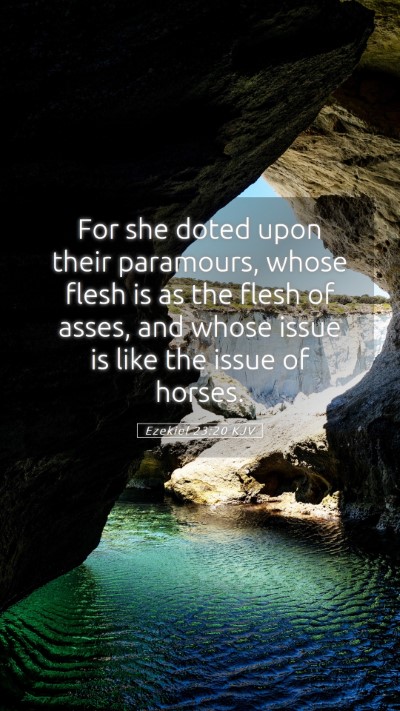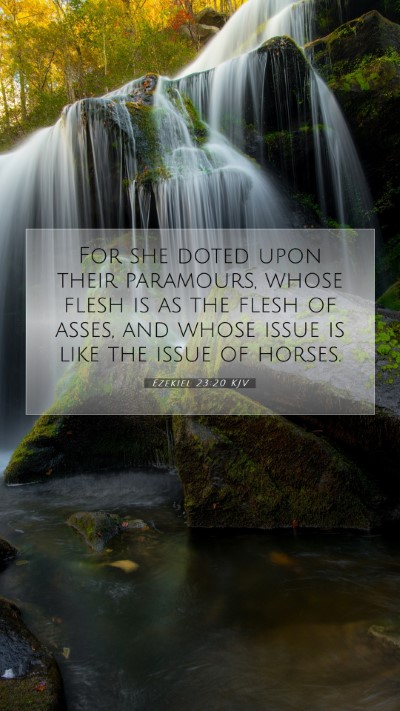Ezekiel 23:20 - Understanding the Verse
Bible Verse: Ezekiel 23:20
"For she doted upon their paramours, whose flesh is as the flesh of asses, and whose issue is like the issue of horses."
Summary of Bible Verse Meaning
This verse from Ezekiel is part of a vivid and allegorical prophecy that illustrates the spiritual infidelity of Israel and Judah. The metaphorical language depicting the actions of the two sisters, Oholah and Oholibah (representing Samaria and Jerusalem), highlights their unfaithfulness to God through their alliances with foreign nations, portrayed here graphically and provocatively. The commentary insights provide a deeper understanding of this complex passage.
Insights from Public Domain Commentaries
- Matthew Henry: Henry suggests that this verse vividly illustrates the depths of sin and spiritual rebellion. By using the imagery of lust towards foreign nations, it shows how far the people strayed from God, indulging in idolatrous practices that were detestable. The comparisons to animalistic behaviors also emphasize a degradation in moral standards.
- Albert Barnes: Barnes emphasizes the significance of the metaphorical descriptions used in this verse. He explains how the references to flesh and issues symbolize deeply rooted desires and actions that are not holy. It showcases unrestrained passion leading the people astray, revealing their disloyalty to God's covenant and the dire consequences of such actions.
- Adam Clarke: Clarke's exposition brings out the intense imagery used to convey the nature of idolatry. He notes that this is not just a physical description but a representation of spiritual corruption. The references to "paramours" indicate the allure of foreign alliances which enticed the Israelites, ultimately leading to their downfall and destruction. Clarke warns that the spiritual implications of this sin are severe, considering the covenant between God and His people.
Significance of the Context
The context of Ezekiel 23 pinpoints the moral decay and the pursuit of idolatry, highlighting how the Israelites' relationships with surrounding nations served to betray their covenant with God. Understanding this verse is essential for grasping the overarching theme of redemption and divine judgment present throughout the book of Ezekiel.
Application of the Verse
Through the stark imagery in Ezekiel 23:20, believers are prompted to reflect on their own fidelity to God and discern the areas of life influenced by the ‘paramours’ of the modern world—materialism, secular ideologies, and spiritual complacency. This scripture serves as a potent reminder of the dangers of wandering from divine truths.
Related Bible Verse Cross References
- Ezekiel 16:15 - Signals betrayal through unfaithful dealings with foreign nations.
- Hosea 2:5 - Discusses the unfaithfulness of Israel likening it to adultery.
- James 4:4 - Affirms that friendship with the world is enmity with God.
- Isaiah 57:7 - Highlights spiritual harlotry with idolatrous practices.
- Jeremiah 2:25 - Illustrates how Israel engages in folly and lust towards idols.
Bible Study Insights
Engaging with Ezekiel 23:20 through a structured Bible study can help deepen the understanding of God's expectations for His people and the consequences of straying from His path. Utilizing Bible study tools and resources can enrich this exploration:
- Bible Study Groups: Discussing this verse in community settings enhances interpretation through shared insights.
- Online Bible Study: Accessing diverse commentaries and scholarly works can provide various perspectives on the text.
- Bible Study Lessons: Structured lessons focusing on the themes of fidelity and repentance can guide meaningful applications.
Understanding Difficult Bible Passages
If you’re exploring how to interpret Bible verses or need guidance in understanding difficult Bible passages, the analysis of Ezekiel 23:20 offers a profound opportunity for reflection on faithfulness. The symbolism used serves as a reminder of what it means to uphold a spiritual covenant in a world filled with distractions.
Conclusion
In conclusion, Ezekiel 23:20 serves as a call to examine one's spiritual life against the backdrop of faithfulness versus infidelity. The rich commentary provided by scholars such as Matthew Henry, Albert Barnes, and Adam Clarke highlights the verse's significance in understanding Israel's relationship with God, and it facilitated a broader interpretation that speaks to contemporary issues of faith.


